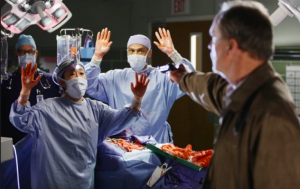
Grey’s Anatomy: The Underlying Political Messages of a Medical Drama
Jessie Hem
10/13/17
English 117 Essay 1
Grey’s Anatomy: The Underlying Political Messages of a Medical Drama
The show Grey’s Anatomy often bring to mind images of attractive doctors, action packed episodes, memorable patients, and unrealistic medical scenarios. The show aired on ABC on March 27, 2005 and follows the lives of several doctors as they make their way through residency at a hospital in Seattle. At first glance, Grey’s Anatomy appears to fit in the category of “medical drama” as opposed to a “political drama” which categorizes shows like West Wing and House of Cards. The show takes place entirely in a hospital with the main focus of every episode being the medical cases of two or three patients. The scenarios in this show are based off of real life medical cases although they are often very rare and provide unrealistic solutions to such cases. However, Grey’s Anatomy supports the idea that all stories mimic a real life social or political problem through the underlying political issues incorporated into its storylines. Now in its fourteenth season, the show has been around for over a decade and thus through the rise and fall and many different political issues. Through its medical and personal storylines, Grey’s Anatomy therefore portrays many of such issues relevant to the time the season or episode aired.
In the second episode of Grey’s Anatomy, Izzie, one of the main characters in the first five seasons, treats a women who only speaks mandarin. The women keeps frantically attempting to communicate eventually motioning for Izzie to follow her outside. Izzie follows the women and finds that the woman’s daughter, Ahn, had suffered a head injury and is in need of treatment. Ahn tells Izzie that she and her mother were in a factory accident but she couldn’t come inside the hospital because she does not have a green card and fears getting arrested. Izzie treats Ahn outside and gives Ahn her pager number in case she needs anything in the future (“The First Cut is the Deepest”). This episode aired on April 3, 2005, the same year that the United States saw its highest levels of immigration since 1992 (Modern Immigration), thus making immigration a prominent topic that year.

Whether or not it was conscious, Grey’s Anatomy writer Shonda Rhimes incorporated aspects of the current political climate into this episode. The nature of the show puts an emphasis on the characters and the medical plot often making it easy to overlook the underlying political messages. However, when something like immigration appears in a TV show, it typically has political implications. The episode portrays a young mother and her child who are scared to seek the medical help they desperately need because of the possibility they will get arrested. Their “illegal” status causes them to put their lives at risk in order to stay in the United States. The episode therefore causes viewers to sway to the side of the immigrants as opposed to the anti-immigration policy imposed by the government. The episode also shows that kind doctors, like Izzie, are needed to treat such immigrants even if it causes them to risk losing their jobs. It is ambitious to think that kind doctors are the solution to the vast political issues surrounding the healthcare of illegal immigrants, but the episode does portray them as one potential solution to these problems.
Another political aspect of the show revolves around the relationship between two women, Callie and Arizona, who are both surgeons at the hospital. Callie is from a big catholic family and had been with men her whole life. When she comes out as a lesbian, her mother refuses to attend her wedding and her father attempts to “convert” her back to being straight. He shows up at the hospital with a priest prompting Callie to yell, “You can’t pray away the gay” as she storms out of the room (“Grey’s Anatomy”). Gay marriage has long since been a large political issue in the United States. On a smaller scale, the topic causes conflict in many families, especially those who are religious. Grey’s Anatomy reflects such issues particularly at a more personal level through its portrayal of Callie and her relationship with her homophobic Catholic family. Callie is essentially exiled by her family after coming out. Her father initially makes an attempt to accept her for who she is but ultimately ends up cutting all ties with his daughter. The show demonstrates the consequences of coming out in a religious family and thus sheds a negative light on Catholicism itself as viewers become attached to Callie and then feel a sense of remorse towards her religion and how it causes her family to betray her. On a more positive note, the show then shows how Callie’s uses her work as an orthopedic surgeon as a distractor from her personal troubles allowing her to rebuild her life after her family’s betrayal. The other characters in the show who work with Callie also rally around her in her times of difficulty. Therefore Grey’s Anatomy shows that a potential solution to familiar difficulties due to homosxualoty is the support of accepting friends combined with an engaging field of work. This solution is somewhat unrealistic as it is not attainable for everyone in Callie’s situation.

Gun control has also long since been a highly debated topic in the United States. Some believe that the right to bear arms is fundamental to their safety while others believe that it creates avoidable dangers and leads to many unnecessary deaths (Gun Control). The topic of gun control has had increased media attention of late due an increased amounts of mass shootings. Grey’s Anatomy mimics these political issues in the final episode of season six. In this episode, Gary Clark, the deranged husband of a former patient, comes to the hospital with the sole purpose of “avenging” his wife’s death by killing the doctors he believes prematurely pulled her life support. Clark kills 11 people and wounds another 7, including main character Derek Shepherd (“Grey’s Anatomy”). Throughout the whole shooting episode, viewers are kept on edge as they don’t know where Clark is, how many bullets he has left, or who his next target is. The episode is so intriguing that viewers feel a real sense of fear for the characters in the show and can’t help imagining how they would react to a real life active shooter situation. The political message conveyed is therefore anti-gun as viewers watch many innocent people, including characters in the show they have become attached to, get shot by a seemingly merciless gunman.
This episode provides no real solution to the issue of gun control other than to sway viewers to the left of the issue. However, the end of the episode shows the unharmed doctors working tirelessly to save the lives of their coworkers who have been shot thus showing that the hard work of physicians can literally “fix the holes” created by guns. While this solution is not realistic it does provide viewers with a sense of hope that doctors can save those harmed by gun violence.

Political issues involving women in the workplace are also reflected in Grey’s Anatomy, specifically through the character Miranda Bailey. She is a black women in the medical field making her in the minority in both race and gender. She is a talented doctor but starts her out career being very shy. She is frequently overshadowed by more authoritative residents. As the show progresses, Bailey also progresses in terms of her confidence, skill, and assertiveness. She becomes one of the most respected doctors in the hospital eventually becoming Chief of Surgery. Bailey’s progression in the workplace mimics the progression of women in the workplace in the real world. Through Bailey, Grey’s Anatomy shows that women have made great progress in terms of being able to hold positions of power. Whether or not it is always true, the show also demonstrates that through hard work and confidence, women are able to progress up the ranks in their place of work.
However, when Bailey is Chief of Surgery, she faces challenges that her male counterparts did not when they were Chief. For example, in the third episode of season 14, the male owner of the hospital visits to have a meeting with Bailey as he is not pleased with how she is handling the hospital’s finances. He manages to make derogatory statements such as “this is what happens when you leave a women in charge of a hospital” before dropping dead. His death signifies the death of a male controlled work place as he was one of the shows last sexist white males in a position of power. However, the fact that he still felt he could make offensive statements towards Bailey without repercussions shows that sexism is still a large issue thus leaving viewers with mixed messages as to how the show views the progression of women.
Many of the story lines in Grey’s Anatomy have unlying political messages. The show causes viewers focus on its medical storylines and the personal relationships between the doctors making it easy to overlook its politics. However, Grey’s Anatomy mimics real life political issues through medical storylines while offering solutions to those problems. These solution are often unrealistic, for example, being able to save someone that has been shot in the heart, or being content with just your work after being betrayed by your family. However, the show gives viewers a sense of hope in that theses solutions often make sense in the context of the show, you just have to accept that they may happen in real life. At first glance, Grey’s Anatomy takes a position towards the left of the political scale. The show is pro-immigration, gay rights, gay marriage, gun control and women. That being said, leftist politicians frequently look to the poor, undereducated, or unprivileged to solve the nation’s political issues. On the contrary, Grey’s Anatomy portrays surgeons, some of the most well educated and well paid people in the country, as those who are most capable of solving said political issues. Therefore, we can ask the question of where exactly does the show stand on the political scale?
Works Cited
Abrams, Natalie. “Grey’s Anatomy Scoop: Callie and Arizona Are Getting Married.” TVGuide.com. N.p., 01 Apr. 2011. Web.
“Ahn.” Grey’s Anatomy MRD Wiki. N.p., n.d. Web.
“The First Cut Is the Deepest.” Grey’s Anatomy Universe Wiki. Fandom, n.d. Web.
“Grey’s Anatomy Episode Guide | Season 1 Full Episode List – ABC.com.” ABC. ABC, n.d. Web.
“”Grey’s Anatomy” Mini-cap 605: “Invasion”.” AfterEllen. N.p., 19 Oct. 2009. Web.
“Gun Control.” ProConorg Headlines. ProCon, n.d. Web.
“Modern Immigration Wave Brings 59 Million to U.S., Driving Population Growth and Change Through 2065.” Pew Research Center’s Hispanic Trends Project. Pew Research Center, 27 Sept. 2015. Web.
“Seattle Grace Mercy West Shooting.” Grey’s Wiki. N.p., n.d. Web.